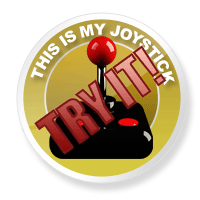Reviews
The Witcher 2: Assassins of Kings Enhanced Edition
May 25, 2012, Author: Andy Corrigan
Having never really been a PC gaming kinda guy, it goes without saying that my direct experience with The Witcher has been somewhat limited. From everything I’ve seen previously, it’s always given the impression of the type of role-playing experience that would appeal to me, but without a PC powerful enough to run it, I thought I’d never have the pleasure.
Thankfully, developer CD Projekt RED hadn’t really forgotten about us on the ‘lower tier’ of gaming; as their sequel, The Witcher 2, finally made it to Xbox 360.
Is it the adventure I’d been hoping for? Let’s see…
The King is dead. Long live the Witcher…
So for those who haven’t played the previous game or read the books from which the game derives, Witchers are practically the fantasy version of Halo’s Spartans. Taken in as children and subjected to magic and intense combat training until they’re ready to work as monster hunters for hire, not many of them live through the brutal nature of their conditioning. One Witcher, Geralt of Rivia, was always able to withstand much more punishment than his peers, though the strain of his process turned his hair white.
At the start of the Witcher 2, Geralt is a prisoner of Temeria, having been unjustly framed as the murderer of King Foltest. Thankfully for him, his captor, Vernon Roche, believes his story and helps him escape. The pair meet up with Triss, Geralt’s sorceress ‘companion’, and off they set to find the real Kingslayer.
Unfortunately, if you’ve not played the previous game, picking this all up amongst the non-chronological epilogue can be a little difficult. Not that the basic premise isn’t obvious; you’ve been framed and must clear your name, but there’s a lot of in-betweens that the game assumes you should know. Once you get past this, it’s a very enjoyable experience thanks to a deep and mostly mature plot. You’ve just got to have patience.
The dialogue plays a massive factor in this. It’s wittily written, and most of the key characters come across as intelligent thinkers, with sharp, snarky lines. Geralt is also a marvellous character, with many levels of depth outside of his default ‘I’m a morbid baddass’ approach, even if you don’t see them often. If I’m honest, there was a lot here in terms of characterisation that I preferred over BioWare’s work, as good as they have been with that.
You can also drastically change the plot, events and quests you’re likely to receive thanks to the decisions you make along the way, forcing you to make snap judgements that can forever alter what happens.
You do have to be aware that there’s a fair amount of misogyny in the Witcher’s world, though I assume it’s in a bid to capture the depicted medieval era. Very quickly it feels as if every woman you encounter is a whore or an untrustworthy wench looking to double-cross or murder you in some way. NPCs freely address the women using the c-word (although, they do address everyone with that word at some point) and even Triss as Geralt’s love interest freely whips her muff out at every given opportunity. Well, her and every other girl that Geralt helps…
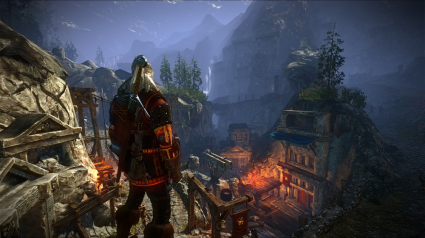
Geralt is a badass...
Make sure you bring the right sword to the party…
In many respects, Witcher 2 falls somewhere between Elder Scrolls and Dragon Age in style and structure, although in pure combat terms it is both better and more brutal than both those games. Only in pure combat terms, let me stress that.
It’s a deep but simple combat system, one that flows slower than a lot of other games of its ilk, but it keeps the swordplay believable, making it feel all the more brutal for it. Although similar in its control scheme on consoles, I want to stop short of claiming it as a less-flighty Kingdoms of Amalur; but the similarities in layout are there to be made.
Geralt will generally carry two swords, a long sword and short silver sword, with the latter only being effective against creatures. Using either sword, it’s pretty easy to string together some lovely-looking and vicious attacks in the light and heavy variety, and their impact can almost be felt as you lay into your enemies. Geralt feels every bit the badass he’s portrayed to be.
Like in KoA, you can duck and roll, diving out of the way of projectiles or charging attacks, putting distance between you and your target. You can guard and parry attacks with the right trigger, while magic will help temporarily trap or attack foes or even help buff yourself. Magic is available right from the off, using the assigned power with a press of the Y button, with initial usage limited to two uses until a short cool-down period expires. Changing your magic or weapon is pretty easy too, as holding down the left bumper sees the game go into slow motion so that you can make your selections tactically and relatively safely during combat.
As satisfying as the combat is (and it really is when you get into it), I have to warn you that it is an enormously challenging game to play at times. If you don’t go into a battle prepared (especially against bosses), you’ll find yourself dying over and over. You’ll probably hit moments early on when you’re feeling frustrated or unfairly treated as powerful enemies gang up on you from all sides. This is made worse when you realise that you can’t heal during combat either. Not in the traditional sense, anyway.
Geralt’s health, dubbed Vitality, will slowly regenerate over time as long as you’re not being hit, and there is no ‘Health Potion’ that will magically save you from being slain. You can, however, take potions before battles that will increase the rate at which vitality will recover. It gets easier the more you level up, though.
There are some niggles too. Targeting is managed with a pull of the left trigger; however, you’re still very much in control of Geralt’s general direction, and as such it’s very easy to waste attacks and magic in the flurry of dealing with a pack of enemies. Also, while there’s a great feeling to dishing out the damage, there’s a distinct lack of feedback in taking it. Often I’d be thinking that I was kicking arse, only to find myself dead or nearly dead because it didn’t feel like I was getting hit.
This brings me to my next point. Save all the time. Save more than you did on Skyrim. Save as if your progress depended on it, because it really does. This is a game often stingy on checkpoints, at best inconsistent, even when passing between load screens. With how quickly you can become overwhelmed, a surprise death can see you lose hours of an area’s exploration or side-quest completion. I fell victim of this a lot early on, and let me tell you that it’s a real chore to constantly retrace your steps.
The rest of the game is made up of traditional fantasy RPG elements. You’ll wander beautiful environments that appear huge in scale, talk to villagers, acquire quests and side-quests, while constantly learning about the world and its many cities and villages as you go. You’ll play Ye Olde pub games, take part in fist fights (glorified QTE), and loot items. Looting is pretty easy; all you have to do is face the camera in the direction of a stack of boxes, and an icon will appear above everything you can loot from. You’ll then instantly take all the gear at the same time, without consequence.
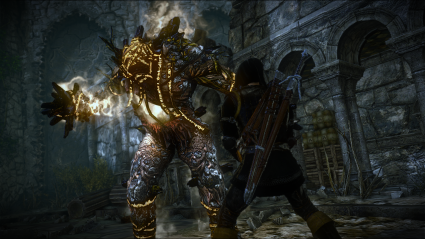
The combat is great fun.
The way conversations play out should be familiar to anyone who’s played a Bioware game, as that’s what they most closely resemble. It works exactly as you’d expect, offering you multiple paths of dialogue, with passive or aggressive options and persuasion or intimidation paths to try. I did have it glitch a couple of times to hilarious end, though, and no more so when I started a conversation with someone who happened to be pissing against a wall. The game popped me into the conversation system, but the guy was still leaking fluid from his groin, totally hands free as if nothing was wrong. While clearly a bug, I do at least appreciate the fact that it was fucking funny.
The game does not hold your hand when it comes to quests either. Not one bit. Often you won’t even get so much as a mission marker for your objective, requiring you to keep a track of largely insignificant NPC names and the names of particular regions or areas. Even there you’ll have to resort to some investigation using your own wit, and if you’re short of patience for the finer details it can lead to a lot of clueless wandering.
Unfortunately, I did find occurrences where missing mission markers meant broken quests. I found more than a few of these instances during Chapter 2, where certain events wouldn’t trigger as they should have because (I assume) I had done things in a different order to what the game wanted. There was a point in one quest, for example, where an NPC said they’d marked a building on my map, and afterwards the marker didn’t appear like it was supposed to (I consulted a guide to make sure that it should have). Even when I found the right house, there was nothing to do there as there should have been.
Still, sometimes it seems that the ambiguity is intentional. In these situations, you can always just go back through your in-game journal to find out the name of that shanty town or region you passed a while ago. Although, that’s a problem in itself.
The menu system on the whole is probably the worst aspect of the entire game, utterly awkward, requiring multiple, slow menu navigations to get to the important stuff that you’d use regularly. It makes things like alchemy and crafting feel like something you want to avoid, and even spending your skill points after levelling up can be a chore to get to when all you want to do is play.
Other, older games have certainly done this more efficiently. Even the world map doesn’t offer much help, failing to tell you any important information other than where certain shops are in the immediate area, but not what certain districts are called.
Levelling up is handled in a fairly traditional manner. Each time you hit the required number of Experience Points, you’ll be able to spend Talent Points on developing Geralt’s abilities. The skill tree has four different sides to it, with the Training Tree being the only one you can use at first, offering you just a small flavour of what’s contained in the remaining three.
You’ll eventually be able to level up skills in Magic, Alchemy, and Swordsmanship. These will buy you further damage increments, protection against certain types of attack, enhancements to particular magical powers, or improvement to the effectiveness of your taken potions. You can also apply mutagens to certain talents, allowing you to strengthen further.
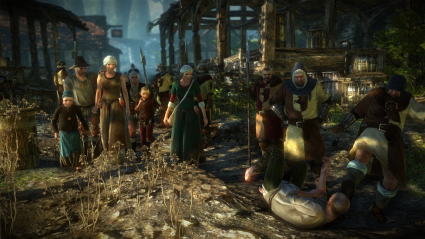
Ye olde kicking!
Witcha’ looking at?
It has to be said that Witcher 2 is one splendid looking RPG, though it does have its fair share of hiccups. The first thing that hits you, though, is this sense of incredible scale. It feels like the world is huge, even if the vividly designed environments don’t actually match that measure at all times. All major characters look nigh-on perfect too, with real character and believable features; while the real stars of the show are the creatures, with some awesome original design on display by CD Projekt RED.
Look a little deeper and you’ll find some of those aforementioned problems, though. Clipping seemed a bit rampant, and the general, non-combat animation could be a little better. Conversations also have that same detached (and slightly creepy) look and feel to them that has plagued most of BioWare and Bethesda’s titles over the years. None of this wrecks an otherwise stylish and visually compelling game, though.
Brummie bastards…
The inhabitants of the Witcher’s world are predominantly voiced by an English cast, with all flavours of dialect creeping in. In amongst the excellent voice acting from key characters, you’ll catch a lot of Scottish, Brummie and Welsh twangs. It’s always a lovely surprise when you find this in games, rather than everyone sounding like a Hollywood English stereotype.
There is a lot of strong language too. Rowdy drunken soldiers sing songs of how they’d had their way with your mother, while F-bombs and C-bombs are dropped often and bluntly. The initial reaction for most is to be appalled, but it just suits the game world so well that it’s hard not to love it. Sound effects too are superb, with combat in particular sounding nice and meaty as you wail on those that oppose you.
There is, of course, a standard fantasy-themed score to accompany the action. It’s suitably stirring and epic as one would expect, but as nearly always true of fantasy games, it’s very easy to label its style as slightly generic. It’s spot-on, though, and at no point will you find yourself turned off by an unwelcome din.
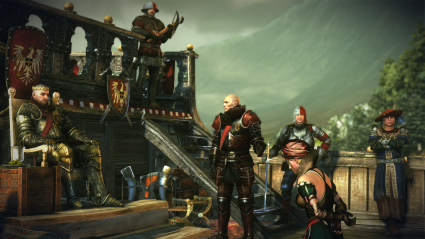
Will you stop the Kingslayer?
Geralt the great?
Despite the many things that the Witcher 2 does well across its many facets, minor bugs and less than perfect design choices nagged at me during my entire playthrough. None were as jarring, however, as the broken quests that hampered my enjoyment from around the midway point. That lack of fulfilment was only compounded further when my save file corrupted just as I was entering the third and final chapter. Although that was likely not the game’s fault explicitly (I’m looking at you, Xbox), it was enough to end my immediate interest in the game.
Having done some research on these issues since, it seems some of similar ilk have appeared for others, although none seemingly to the degree that I personally experienced. My gut feeling tells me that I’ve been really unlucky here and I at least doubt that save corruption is a widespread issue. Unfortunately for me, though, these problems seemed to rear their ugly heads at the exact moments where I felt myself really warming to the game, and as such, it’s impossible for me to feel wholly positive with the outcome.
Still, even with unfortunate circumstances preventing me from finishing Witcher 2, I played enough to safely say that for those who don’t hit those problems that I did, you’ll find a solid and enjoyable RPG that stands against some of BioWare’s best work.
Platforms: PC, Xbox 360 | Tagged CD Projekt, Combat, Geralt, Muff, Mutant, RPG, The Witcher, the witcher 2, Triss Merigold, Troll


